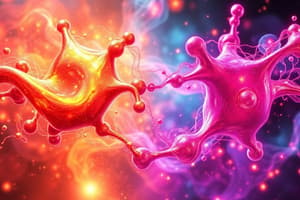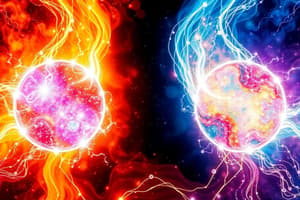Podcast
Questions and Answers
Which of the following is an example of a natural redox process?
Which of the following is an example of a natural redox process?
- Mixing salt in water
- Boiling water
- Rusting of iron (correct)
- Melting ice
What is a redox reaction?
What is a redox reaction?
- A reaction where a species gains protons
- A reaction where a species loses electrons (correct)
- A reaction where a species gains electrons
- A reaction where a species loses protons
What does oxidation involve in a redox reaction?
What does oxidation involve in a redox reaction?
- Gaining electrons
- Gaining protons
- Losing electrons (correct)
- Losing protons
Which process involves the reduction of carbon dioxide to oxygen?
Which process involves the reduction of carbon dioxide to oxygen?
In battery operations, what happens to zinc?
In battery operations, what happens to zinc?
How do chemists determine if a reaction is a redox process?
How do chemists determine if a reaction is a redox process?
What is the purpose of Lewis structures in chemistry?
What is the purpose of Lewis structures in chemistry?
Which concept states that most elements have eight valence electrons in their outer shell?
Which concept states that most elements have eight valence electrons in their outer shell?
What type of bond is formed when atoms share electrons?
What type of bond is formed when atoms share electrons?
Which of the following elements does not follow the octet rule?
Which of the following elements does not follow the octet rule?
How many valence electrons do noble gases like neon have in their outer shell?
How many valence electrons do noble gases like neon have in their outer shell?
What is hypervalency in chemistry?
What is hypervalency in chemistry?
Which elements are known as exceptions to the octet rule?
Which elements are known as exceptions to the octet rule?
What are valence electrons responsible for in chemical bonding?
What are valence electrons responsible for in chemical bonding?
In which type of bond are valence electrons shared between atoms?
In which type of bond are valence electrons shared between atoms?
What determines the molecular geometry of a molecule?
What determines the molecular geometry of a molecule?
Which type of elements are generally more stable and less reactive due to having a full set of valence electrons following the octet rule?
Which type of elements are generally more stable and less reactive due to having a full set of valence electrons following the octet rule?
Which elements have fewer than eight electrons in their outer shell, leading to them being exceptions to the octet rule?
Which elements have fewer than eight electrons in their outer shell, leading to them being exceptions to the octet rule?
Flashcards are hidden until you start studying
Study Notes
Oxidation–Reduction Reactions: Understanding the Transference and Impact of Electrons
Introduction
In chemistry, oxidation-reduction (redox) reactions play a crucial role in our daily lives, ranging from the combustion of fuels to the corrosion of metals. These reactions involve the transfer of electrons between chemical species, resulting in changes to the oxidation state of the participating atoms or molecules. In this article, we will delve into the concept of redox reactions, discuss various examples, and explain how we can identify them using oxidation numbers.
Redox Reactions
A redox reaction is a chemical process where a species either gains electrons (reduction) or loses electrons (oxidation). These reactions occur frequently, playing a significant role in various natural phenomena, such as photosynthesis (where CO₂ is reduced to O₂) and cellular respiration (where glucose is oxidized to CO₂). They can also be artificially induced, such as in battery operations, where zinc is oxidized to form zinc ions, and copper is reduced to form Cu²⁺.
Identifying Redox Reactions
To determine whether a chemical reaction is a redox process, chemists use the concept of oxidation numbers. Oxidation numbers represent the imaginary charges that an atom would have if all of its bonds were ionic. By tracking the changes in oxidation numbers before and after a reaction, we can identify redox events. For instance, when iron reacts with oxygen to form rust, the iron loses electrons and becomes Fe³⁺, while the oxygen gains electrons and becomes O²⁻.
Examples of Redox Reactions
One classic example of a redox reaction is the reaction between magnesium (Mg) and hydrochloric acid (HCl):
Mg + 2HCl → MgCl₂ + H₂
Here, the magnesium is oxidized to Mg²⁺, while the chlorine in hydrochloric acid is reduced to Cl⁻. Another example is seen in the case of glucose being completely oxidized to CO₂ and water:
C₁₂H₂₂O₁₁ + 26O₂ → 26CO₂ + 12H₂O
This process involves oxidation of the carbon in glucose to CO₂, accompanied by reduction of oxygen to water.
Studying That Suits You
Use AI to generate personalized quizzes and flashcards to suit your learning preferences.




